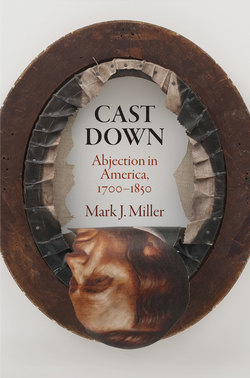Cast Down

Реклама. ООО «ЛитРес», ИНН: 7719571260.
Оглавление
Mark J. Miller. Cast Down
Отрывок из книги
CAST DOWN
Series editors:
.....
Well before his recent encounters with religion, Habermas subtly reframed his analysis of religious publicity by crediting E. P. Thompson’s 1963 Making of the English Working Class for his reconsideration of nonbourgeois publics.92 Thompson’s influence on Habermas has implications for my work on religious abjection in two competing ways. Thompson’s generous evaluation of working-class religious organizers has been inspirational to my work, but Thompson was also one of the first to employ psychoanalytic rhetoric to pathologize religious discourses of suffering. As part of his attempt to moderate celebratory accounts of Methodism’s influence on labor organizers, Thompson proposed that, if English Methodism was a “nursing-ground” for labor, the nurse was a cruel one. Working-class Methodists gained experience in economic and political organizing by struggling against Methodist rules and leaders as much as by working with them.93 Methodist publicity, Thompson concluded, partook of “pathological aberrations of frustrated social and sexual impulses” driven by a “perverted eroticism … by turns maternal, Oedipal, sexual, and sado-masochistic”; its “authentic language” was one “of sexual sublimation streaked through with masochism.”94 In short, for Thompson, sadomasochistic perversion was the internal psychic mechanism that stoked, and was reciprocally stoked by, the economic engine billowing out religion’s ideological smokescreen.
Thompson’s diagnosis of pathological religious masochism was for some time the abject within my own project. Its exemplification of a vexed scholarly engagement with religion made Thompson’s work hard to embrace.95 Why would Thompson, whose measured evaluations of working-class organizing made him vital to Habermas’s reevaluation of the plebian public sphere, criticize English Methodism in such violently normalizing psychosexual terms?96 Whatever its origin or intent, Thompson’s language is deeply rooted in the history of public debates about religion in the seventeenth and eighteenth centuries. More specifically, it is a specimen of critique (quite familiar to Thompson himself) casting religious emotion as a form of erotic perversion.97 Following the seventeenth-century imagination of “sodomite” Quakers, or Gangraena’s delicious denunciations of schismatic “libertinism,” eighteenth-century religious dissenters’ secular competitors for public attention cast doubt on their piety by associating religious emotion with an uncontrollable, often feminized, sexual desire orchestrated by religious elites.98
.....